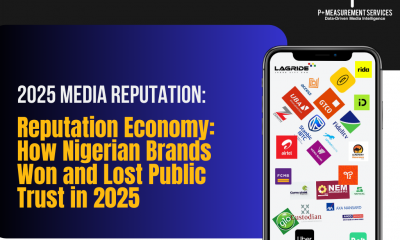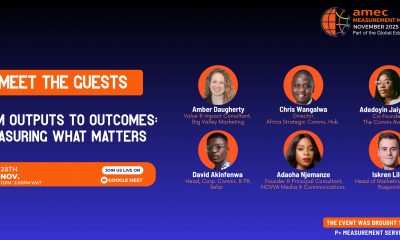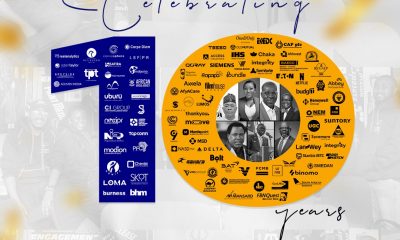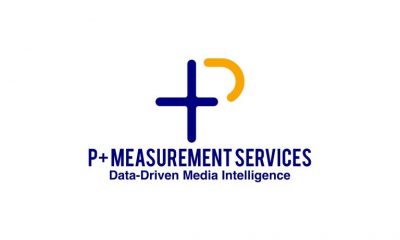Brands/Products
Why Measurement and Evaluation is Necessary for Growth of PR Industry: A Nigerian Perspective

By Philip Odiakose
As a PR measurement specialist and thought leader in PR measurement and evaluation in Nigeria, I have had the privilege of witnessing the transformative impact that rigorous measurement and evaluation practices can have on the public relations industry. In Nigeria, where the PR industry faces unique challenges and opportunities, embracing robust measurement and evaluation frameworks is essential for demonstrating value, enhancing the credibility of the profession, and driving sustainable growth. In this article, I will explore why measurement and evaluation are necessary for the growth of the PR industry in Nigeria, supported by relevant case studies from within the country.
Measurement and evaluation are crucial for showcasing the tangible value and return on objectives (ROO) of PR activities. Many clients and stakeholders in Nigeria often view PR as an intangible service with unclear benefits. Effective measurement and evaluation frameworks allow PR professionals to link their efforts directly to organizational goals, such as increased brand awareness, improved reputation, and heightened customer engagement. This substantiation of contributions is vital for securing greater investment and trust from clients and stakeholders.
Take, for instance, the case of a leading Nigerian telecommunications company that launched a nationwide campaign to promote its new data plans. Through meticulous measurement and evaluation done by the team at P+ Measurement Services, the PR team of the brand was able to demonstrate a 25% increase in customer inquiries and a 15% rise in subscriptions within three months. These results, backed by data, convinced the company’s leadership of the campaign’s success and justified further investment in PR initiatives. This example highlights the importance of measurement and evaluation in providing concrete evidence of PR’s impact on business outcomes.
Enhancing credibility and accountability is another significant benefit of measurement and evaluation. In Nigeria’s competitive market, credibility is paramount. Rigorous measurement and evaluation practices provide transparent and verifiable evidence of PR outcomes. This accountability not only builds trust with clients and stakeholders but also positions PR as a strategic function within organizations. When PR professionals can demonstrate the direct impact of their work on business outcomes, they earn a seat at the decision-making table and can influence organizational strategy more effectively.
Consider the example of a Nigerian non-profit organization focused on environmental conservation. The organization ran a campaign to raise awareness about plastic pollution. By employing comprehensive measurement and evaluation, the brand PR team, with the support of the P+ Measurement team, tracked media coverage, social media engagement, and public sentiment. The results showed a significant shift in public awareness and a notable increase in community participation in cleanup activities. These insights were instrumental in securing additional funding and partnerships for future campaigns. This case study underscores the role of measurement and evaluation in enhancing credibility and accountability within the PR industry.
Measurement and evaluation also play a pivotal role in driving strategic decision-making. Data-driven insights enable PR professionals to make informed decisions about their campaigns and initiatives. By analyzing the effectiveness of PR efforts, identifying strengths and weaknesses, and understanding audience behaviour, PR practitioners can optimize their strategies, tailor their messaging, and allocate resources more effectively. This iterative process of continuous improvement is essential for achieving sustained success in the dynamic PR landscape.
For example, a Nigerian fintech startup launched a PR campaign to introduce a new mobile payment app. My team (P+ Measurement Services) was engaged to provide PR monitoring, measurement, and evaluation. The brand’s PR team discovered that, while media coverage was extensive, customer engagement was lower than expected. By analyzing feedback and identifying gaps in their messaging, the team refined their approach, resulting in a significant uptick in app downloads and user engagement in the subsequent phase of the campaign. This example illustrates how measurement and evaluation can drive strategic decision-making and enhance the effectiveness of PR efforts.
The digital revolution has transformed the PR industry, introducing new channels, tools, and metrics for engagement. Measurement and evaluation are essential for navigating this complex digital landscape. Digital analytics, social media monitoring, and sentiment analysis provide near-real-time insights into audience interactions and measure the reach and impact of digital campaigns. By leveraging these tools with the support of human analysts, PR professionals in Nigeria can adapt their strategies to stay ahead of emerging trends and ensure that their efforts resonate with their target audiences.
For the Nigerian PR industry to fully realize the benefits of measurement and evaluation, it is important to adopt robust frameworks and best practices. Clear, measurable objectives and key performance indicators (KPIs) form the foundation of any effective measurement and evaluation framework. Objectives should align with organizational goals and be specific, measurable, achievable, relevant, and time-bound. KPIs should capture both quantitative and qualitative aspects of PR activities, encompassing metrics such as media coverage, sentiment, engagement, and impact on business outcomes.
A comprehensive measurement approach combines both quantitative and qualitative methods. Quantitative methods, such as media monitoring and web analytics, provide numerical data on reach, frequency, and engagement. Qualitative methods, such as surveys, focus groups, and content analysis, offer deeper insights into audience perceptions, message resonance, and brand reputation. By integrating both types of data, PR professionals can obtain a holistic view of PR effectiveness and make more informed strategic decisions.
Ethical considerations are paramount in measurement and evaluation. PR professionals must adhere to ethical standards and best practices, ensuring transparency, accuracy, and integrity in data collection, analysis, and reporting.
This commitment to ethical measurement practices builds trust with clients and stakeholders and upholds the reputation of the PR profession.
One notable example in Nigeria is the case of a major public health campaign aimed at increasing vaccination rates. The campaign faced scepticism from certain segments of the population, driven by misinformation and distrust. Through comprehensive media monitoring, measurement, and evaluation, the PR team was able to track changes in public sentiment, identify key influencers spreading misinformation, and adjust their communication strategies accordingly. By maintaining transparency and ethical standards in their measurement practices, the campaign ultimately succeeded in increasing vaccination rates and building public trust.
For measurement and evaluation to be truly effective, they must be ingrained in the organizational culture. PR agencies and in-house teams should prioritize measurement and evaluation as an integral part of their PR strategies. This involves continuous learning, training, and capacity building to enhance measurement capabilities and keep pace with evolving industry standards.
In conclusion, measurement and evaluation are indispensable for the growth and success of the PR industry in Nigeria. By demonstrating value, enhancing credibility, driving strategic decision-making, and navigating the digital landscape, measurement and evaluation empower PR professionals to elevate their practice and deliver impactful results. As a thought leader in PR measurement and evaluation, I urge the Nigerian PR industry to embrace robust measurement frameworks and ethical standards, fostering a culture of accountability and excellence. By doing so, we can unlock the full potential of PR, drive meaningful change, and contribute to the sustainable growth of our industry.
The examples provided illustrate how measurement and evaluation can be applied in various contexts within the Nigerian PR industry. They highlight the importance of linking PR activities to organizational goals, enhancing credibility, and driving strategic decision-making. Moreover, they demonstrate the necessity of navigating the digital landscape with the help of advanced tools and technologies.
Ultimately, the adoption of robust measurement and evaluation practices will enable PR professionals in Nigeria to prove their value, secure greater investment, and influence organizational strategy more effectively. This, in turn, will drive the growth and success of the PR industry in Nigeria, positioning it as a vital and strategic function within organizations.
Philip Odiakose is a leader and advocate of PR measurement and evaluation in Nigeria. He is also the Chief Media Analyst at P+ Measurement Services, a member of AMEC
Brands/Products
Lafarge Africa Rewards Customers, Transporters With Luxury SUVs, Others

By Modupe Gbadeyanka
Customers, transporters, and key stakeholders of Lafarge Africa Plc gathered in Lagos on Saturday, February 21, 2026, for the company’s 2025 Customer & Transporter Awards.
The event was put together to recognise the invaluable contributions of customers and transporters who ensure the company’s products reach every part of the country. The 2025 edition celebrated partners whose dedication, integrity, and resilience have strengthened the company’s market leadership despite evolving economic realities.
The chief executive of Lafarge Africa, Mr Lolu Alade-Akinyemi, thanked the trade partners for their loyalty and commitment to the business.
He noted that Lafarge Africa’s growth story would be incomplete without its partners’ market insights, trust, and consistent support. He emphasised that the company would continue to push boundaries in quality, innovation, and high performance, inspired by the strength of its partnerships.
“We are here to honour partnership. We want to thank our customers for partnering with us in 2025. In 2025, we expanded our retail presence and focused on customer experience.
“We strengthened our ready-mix business, launched new products, including Ecoplanet Elephant and Ecocrete, our low-carbon cement and concrete solutions, and walked the talk on innovation, using technology as a competitive advantage. We could not have done this without our customers and partners,” he said.
Also speaking, the Commercial Director of Lafarge Africa, Mr Gbenga Onimowo, described customers and transporters as “trade champions” whose excellence and unwavering belief in the company’s products have sustained the company’s strong position in the market.
“You are a vital part of our business, ensuring our products are visible and accessible across the country. Your contribution merits daily appreciation. Tonight’s expression of thanks is special because it gives us the opportunity to celebrate our wins together, in person.
“While we celebrate tonight’s winners, we acknowledge that every partner here has contributed meaningfully to our success. We believe this recognition will inspire even greater achievements in the year ahead,” he added.
On his part, the Logistics Director for Lafarge Africa, Mr Osaze Aghatise, acknowledged the transporters as the critical bridge between the company and its customers, ensuring efficient distribution and nationwide availability of its innovative building solutions. According to him, the awards serve as both recognition and motivation, encouraging partners to continue raising the bar.
Elder Ubong Bassey Obot of Ubotex Nigeria Limited emerged the National Volume Champion. Igwe Cosmas Ezeumeh Chizoba of C.C. Umeh and Sons Limited and Chief Etim Effiong Okon of Batoframoje Enterprises secured the titles of first and second runners-up, respectively. As the champion, Ubong Obot received a 2026 Toyota Land Cruiser. C.C. Umeh and Sons Limited and Batoframoje Enterprises were awarded a 2026 Toyota Prado and a 2026 Toyota Fortuner, respectively.
Additionally, B.I.G MultiQuest Nigeria Limited was recognised as the National Winner- Best Transporter category and was awarded a 2026 Toyota Hilux. Two customers who emerged as National Growth Champions received 15-kVA generating sets, while 4 regional champions were rewarded with a Toyota RAV 4 each. Other winners received prizes including a Changan CS55, GAC S3, Hyundai Creta cars, 13KVA solar inverters, 80-inch Hisense TVs, and deep freezers, among others.
Brands/Products
Police Bust Factories Destroying Beverage Bottles, Crates in Anambra

By Aduragbemi Omiyale
Some factories used for the destruction of returnable packaging materials, including glass bottles and plastic crates belonging to various beverage manufacturing companies, have been busted by officials of the Nigeria Police Force (NPF) in Anambra State.
The security operatives stormed these sites on Thursday in collaboration with the Beer Sectoral Group (BSG) of the Manufacturers Association of Nigeria (NPF).
The Executive Secretary of BSG, Ms Abiola Laseinde, described the act as criminal and a serious economic sabotage, noting that these assets remain the property of beverage companies that have invested heavily in these sustainable packaging materials to protect the environment.
She warned those involved in the act to desist, as offenders will be held liable and made to face the wrath of the law, as the organisation will continue to work with the police to crack down on illegal disposal, theft, and unauthorised recycling of its returnable packaging materials, notably returnable glass bottles and plastic crates.
Ms Laseinde noted that the owners of these factories were involved in destroying returnable packaging materials for reuse, thereby causing the businesses to lose millions of naira in investments.
She added that the group had engaged relevant security and regulatory authorities through formal petitions and intelligence-sharing, seeking lawful intervention to curb the illegal practices, recover company assets, and dismantle unauthorised recycling operations.
According to her, the group identified multiple locations in the South-East where they crush our bottles and crates for resale as raw materials, stressing that investigations had revealed that significant quantities were being diverted from legitimate channels into informal recycling networks.
The BSG scribe also disclosed that, in several instances, bottles were deliberately broken and crates were intentionally shredded for sale as raw materials, undermining the beverage companies’ circular packaging model.
“The recent raid is the outcome of sustained engagements and intelligence-led investigations, and represents a decisive step by authorities to protect legitimate business operations, uphold environmental standards, and deter further illegal activity,” she said.
Ms Laseinde pointed out that, beyond the asset loss, the activities of these individuals pose significant risks to businesses, including supply chain disruptions, increased operational costs, environmental risks arising from unsafe recycling practices and threats to public safety.
“These Returnable Packaging Materials (RPMs) are company-owned assets designed for multiple reuse cycles and form a critical part of their sustainability, cost-efficiency, and product quality systems. It’s a criminal activity to destroy them,” she stated, urging the public to remain vigilant and report any suspicious activity of this nature to the police or call the consumer care lines of the beverage companies.
Brands/Products
Unilever Partners Google Cloud to Sustain Long-term Competitive Edge
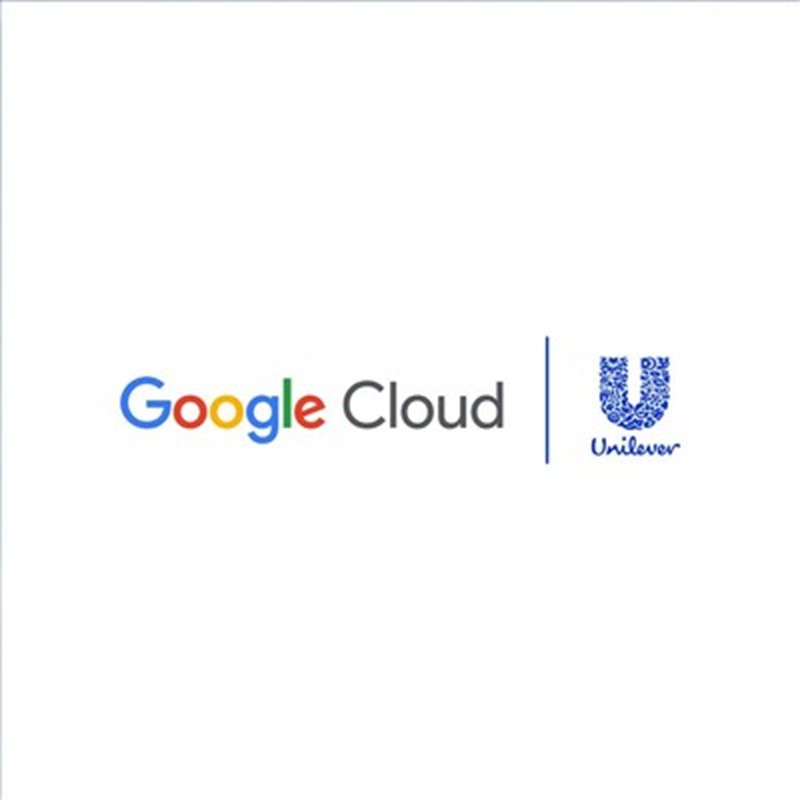
By Aduragbemi Omiyale
One of the leading global brands, Unilever, has sealed a five-year deal with Google Cloud for the deployment of technology, especially Artificial Intelligence (AI) to drive growth and desirability for its brand portfolios like Dove, Vaseline and Hellmann’s.
Business Post reports that the collaboration will focus on three core pillars of agentic commerce and marketing intelligence, an integrated data and cloud foundation, and advanced AI.
According to a statement, both parties will collaborate to build next-generation marketing capabilities across brand discovery, conversion and measurement to ensure that Unilever remains at the forefront of shifts in technology and consumer habits.
In addition, Unilever will transition key enterprise applications and data platforms to Google Cloud, creating a connected environment for scalable AI deployment across the value chain.
Also, this partnership will fast-track Unilever’s adoption of pioneering technologies, combining Unilever’s deep expertise with Google’s AI capabilities to sustain Unilever’s long-term competitive edge within the CPG market.
The Chief Supply Chain and Operations Officer at Unilever, Willem Uijen, said, “Technology has moved to the core of value creation at Unilever. As brands are increasingly discovered and chosen in environments shaped by AI, we must lead this shift.
“This collaboration with Google Cloud sets a new level in how technology can power commerce and growth in the fast-moving consumer goods industry, ensuring Unilever is agile, fit for the future, and equipped to unlock value at every level of the company.”
Also commenting, the EMEA president for Google Cloud, Tara Brady, said, “In partnering with Unilever as it boldly reimagines its business processes, we are not just modernizing legacy systems; we are deploying our advanced models, such as Gemini, to create a system of intelligence that reasons, learns, and acts. This will set a new standard for agility and consumer engagement in the CPG sector.”
It was gathered that Unilever would use Google Cloud’s technologies, such as its enterprise AI platform, Vertex AI, to build new capabilities in brand discovery, measurement and AI-augmented marketing. This will create a new model for how consumer packaged goods (CPG) brands are discovered and shopped, as consumer journeys shift toward more conversational and agentic experiences.
By migrating its integrated data and cloud platform to Google Cloud, Unilever will build an enterprise-wide, AI-first digital backbone to generate demand faster, turn data into actionable insights, and respond to market shifts with greater agility. This foundation will also support the development of agentic workflows—intelligent systems capable of executing complex tasks across Unilever’s business processes.
-

 Feature/OPED6 years ago
Feature/OPED6 years agoDavos was Different this year
-
Travel/Tourism10 years ago
Lagos Seals Western Lodge Hotel In Ikorodu
-

 Showbiz3 years ago
Showbiz3 years agoEstranged Lover Releases Videos of Empress Njamah Bathing
-

 Banking8 years ago
Banking8 years agoSort Codes of GTBank Branches in Nigeria
-

 Economy3 years ago
Economy3 years agoSubsidy Removal: CNG at N130 Per Litre Cheaper Than Petrol—IPMAN
-

 Banking3 years ago
Banking3 years agoSort Codes of UBA Branches in Nigeria
-

 Banking3 years ago
Banking3 years agoFirst Bank Announces Planned Downtime
-

 Sports3 years ago
Sports3 years agoHighest Paid Nigerian Footballer – How Much Do Nigerian Footballers Earn


